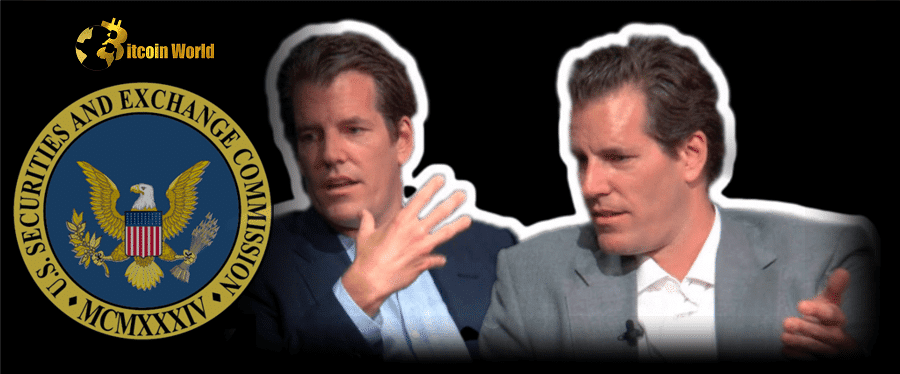The gloves are off in the latest crypto regulatory showdown! Tyler Winklevoss, the co-founder of cryptocurrency exchange giant Gemini, has unleashed a barrage of criticism against the Securities and Exchange Commission (SEC) following charges against his company. Feeling like they’ve been unfairly targeted? Winklevoss didn’t hold back, labeling the SEC’s actions as “absolutely unproductive,” “very pathetic,” and even a “fabricated parking ticket.” Let’s dive into what’s fueling this fiery response.
What Sparked Winklevoss’s Fury?
The SEC’s beef with Gemini stems from its “Earn” program. The regulator alleges that this program, which allowed Gemini customers to earn interest by lending their crypto, constituted the offering of unregistered securities. Winklevoss, however, sees it differently. He took to Twitter on January 12th to express his frustration, arguing that the SEC is “optimizing for political points” rather than constructive solutions.
The Timeline of Discontent: 17 Months of Talks
Adding fuel to the fire, Winklevoss claims Gemini had been in discussions with the SEC about the Earn program for over a year and a half. Imagine spending that much time trying to collaborate, only to be hit with enforcement action. According to Winklevoss, the possibility of such action wasn’t even hinted at until after Genesis, a key partner in the Earn program, froze withdrawals on November 16th. This timing clearly doesn’t sit well with him.
How Did Gemini’s Earn Program Work?
Launched in February 2021 and running until January 8, 2022, Gemini’s Earn program partnered with Genesis, a cryptocurrency lender and a subsidiary of Digital Currency Group (DCG). Here’s a simplified breakdown:
- Gemini customers could lend their cryptocurrency through the platform.
- Genesis would then use these crypto assets for its market-making activities.
- In return, Gemini customers would earn interest on their lent crypto.
This model was seemingly working until the domino effect of FTX’s collapse rippled through the crypto world.
The FTX Fallout: A Domino Effect
Genesis found itself caught in the crossfire of the FTX implosion. In early November, it revealed holding approximately $175 million on the now-defunct exchange. While DCG attempted to bolster Genesis’s balance sheet with a $140 million transfer, it wasn’t enough to prevent Genesis from halting withdrawals on November 16th due to FTX’s insolvency. This freeze directly impacted Gemini Earn users.
The Impact on Gemini Earn Users: A Staggering Sum
The consequences of Genesis’s withdrawal freeze are significant. According to open letters penned by Tyler’s brother and co-founder, Cameron Winklevoss, a staggering $900 million is owed to 340,000 Gemini Earn users. That’s a lot of people and a lot of money hanging in the balance.
What’s Next? Gemini’s Stance and the Road Ahead
Despite the SEC’s charges, Tyler Winklevoss remains defiant. He stated that Gemini will vigorously fight the unregistered security allegations. His priority? To ensure this legal battle doesn’t derail their efforts to recover the funds owed to Earn users. This situation highlights the ongoing tension between crypto innovation and regulatory oversight.
Key Takeaways: Navigating the Crypto Regulatory Landscape
- Collaboration vs. Enforcement: The case underscores the debate around how regulators should engage with the rapidly evolving crypto industry. Is collaboration more effective than immediate enforcement actions?
- The Ripple Effect of Market Events: The FTX collapse serves as a stark reminder of the interconnectedness and potential vulnerabilities within the crypto ecosystem.
- User Protection at the Forefront: The plight of the 340,000 Gemini Earn users highlights the critical need for clear regulations and consumer protection in the digital asset space.
- The Ongoing Dialogue: This situation is unlikely to be resolved quickly and represents a significant chapter in the ongoing conversation between crypto companies and regulatory bodies.
Looking Ahead: A Fight for Recovery and Clarity
The clash between Gemini and the SEC is more than just a legal dispute; it’s a reflection of the broader challenges facing the cryptocurrency industry as it seeks mainstream adoption while navigating complex regulatory frameworks. Winklevoss’s strong reaction signals a determination to fight the charges and, more importantly, to prioritize the recovery of funds for affected users. The coming months will be crucial in determining the outcome of this battle and its implications for the future of crypto regulation.
Disclaimer: The information provided is not trading advice, Bitcoinworld.co.in holds no liability for any investments made based on the information provided on this page. We strongly recommend independent research and/or consultation with a qualified professional before making any investment decisions.


